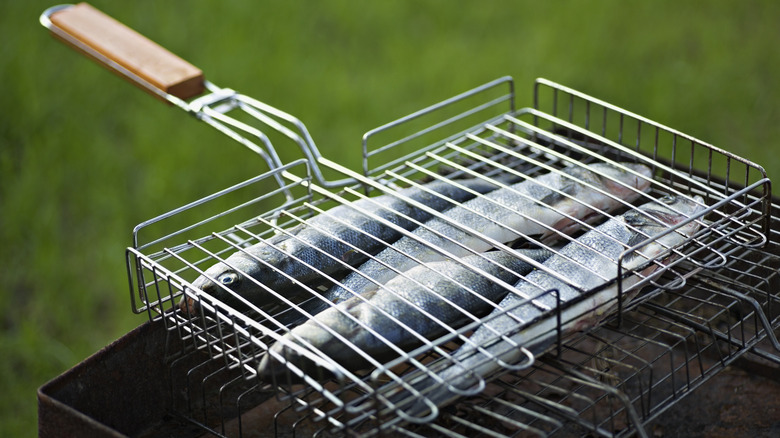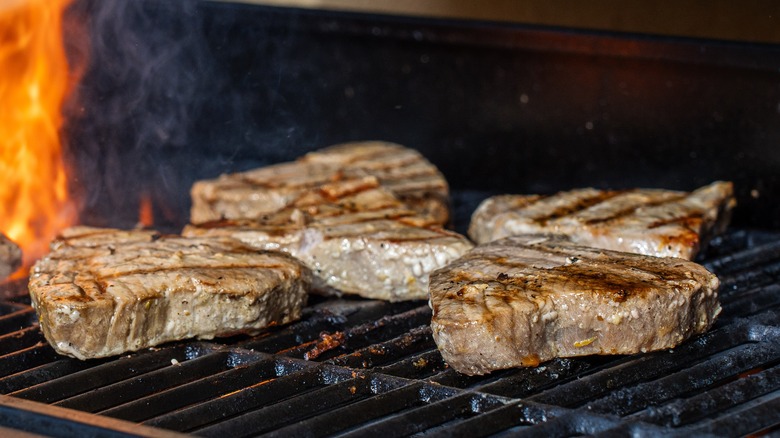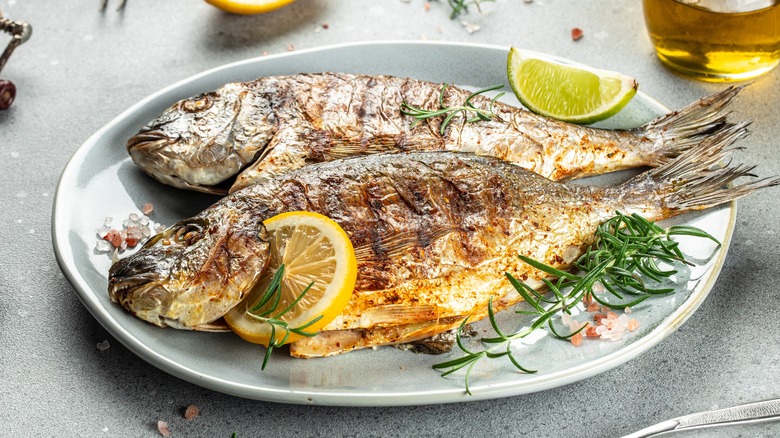Are Fish Baskets Worth It When It Comes To Grilling?
There are plenty of grilling and BBQ accessories that are worth the investment, like a charcoal chimney starter or a good quality meat thermometer. But what about those wire fish baskets? Food Republic spoke to Rich Parente, chef and owner of Clock Tower Grill in Brewster, New York, to get his take on how important fish baskets really are when it comes to successfully grilling food from the sea.
Parente does not typically use a fish basket, and instead relies on tools many cooks probably already have on hand. In most cases, he just places the fillet directly on the grates and opts for a fish spatula when it comes time to move it. A fish spatula is long, thin, and flexible, with an angled edge that more readily slides under the protein. (Standard spatulas can be too thick to easily wedge underneath, and they tend to tear or mash the flesh in the process.) Direct grilling, as Parente suggests, will work well for hearty and firm texture fish such as tuna, swordfish, mahi mahi, and salmon, all of which make some of the best fish steaks for grilling beginners.
For softer fish, such as trout, halibut, mackerel, grouper, or catfish, or particularly thin fillets, Parente gave Food Republic a great hack: "Sometimes I'll put a wire rack on top of a grill when cooking delicate foods in order to create more surface area and reduce the chances of the food getting stuck," he shared.
More tips for grilling fish
The single most important thing you can do to ensure that your fish grilling experience goes smoothly is adequately preheating your grill. Not only does this step help ensure that the fillets will not stick, since the high heat will cook them quickly, but it also reduces the chances of them drying out. Aim for a temperature between 400 and 450 degrees Fahrenheit, which should take around 10 to 15 minutes to preheat. Once hot, give the grates a good scrub with a wire brush, and wipe them down with a lightly-oiled towel.
To prepare the fish for the grill, let the fillets sit out for a few minutes to bring them up to room temperature, and then oil and season both sides. Whether you are grilling a whole fish, a skin-on fillet, or skinless piece, once you lay it down on the grill, do not mess with it. Fish will actually tell you when it's ready to be flipped by releasing from the grates.
Gently slide the fish spatula under the edge, and try to lift it. If you encounter any resistance, the fish is not ready yet, and you will need to make another attempt in a minute or two. Once you are able to cook the other side, remove the fish from the grill. It does not need to rest for as long as meat after grilling, but you should still give it about five minutes before serving.
If you already have a fish basket, use it!
For expert Rich Parente, relying on a fish basket is not strictly necessary for grilling the protein. However, if you already have one, there are circumstances where they can be "helpful," he says. A fish basket can take some of the pressure off if you are feeling intimidated about grilling fish in general or cooking for a large group for the first time. They can also be a welcome aid for larger pieces that are hard to turn, like a whole fish filled with herbs and lemon slices.
The biggest advantage of a fish basket is that you can flip its contents in one fell swoop. The tool closes like a waffle iron around the fish, and you simply turn the fillets by lifting up the whole device, using the handle, and flipping it over. It reduces the margin for error since you don't have to try and move each fillet individually. Just make sure to oil the interior before loading it up.
A fish basket is also a good tool for other types of seafood that could easily fall through the grill grates, such as shrimp, scallops, squid, or octopus. Parente also recommends using the device "when grilling small or delicate foods, like vegetables and fruit, that have a tendency to roll around on the grill." Use the basket to cook mushrooms, cherry tomatoes, sliced summer squash, grapes, plums, and more — meaning no need to mess with cumbersome skewers!



